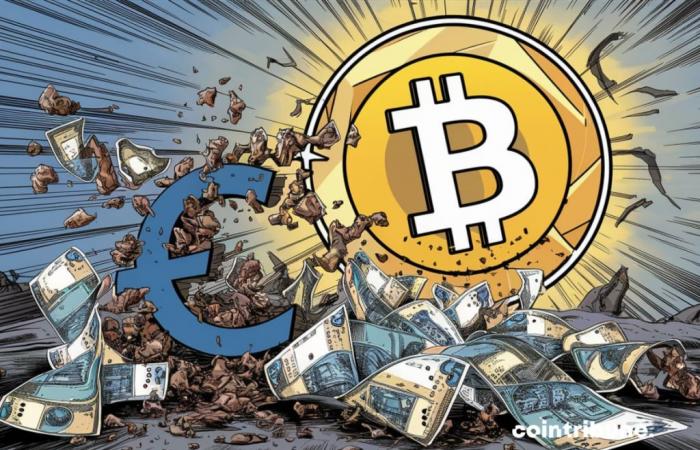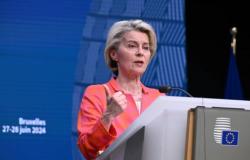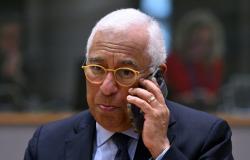Tue June 18, 2024 ▪
6
min reading ▪ by
Nicholas T.
The ECB has published its annual report on the international standing of the euro. Will it soon compete with bitcoin in international foreign exchange reserves?
The Euro, an international currency in decline
If the dollar is in trouble lately, the euro is not celebrating either. The introduction to the report written by the President of the ECB ends with a warning.
“Some countries are increasingly seeking to do without the main invoicing currencies for international trade as well as traditional cross-border payment systems (SWIFT). The accumulation of gold as a reserve asset continued, notably in countries closely linked to Russia, as well as in non-standard reserve currencies. Overall, this suggests that the international currency status of the euro should not be taken for granted. »
According to the report, the single currency accounts for 20% of global foreign exchange reserves, down 0.5% year-on-year. Knowing that global reserves are equivalent to 11,450 billion dollars.
-Collapse of the dollar
-The euro is slowly decreasing
-Other currencies (mainly in the G7 orbit): rapid increase. »
Let us recall in passing that Europe has frozen 250 billion euros belonging to Russia and without which the euro’s share falls to 17.7%…
The dollar’s share is 58.4%. This figure is, however, misleading since it is inflated by the appreciation of the dollar. The IMF recently gave a figure of 55% at constant exchange rates.
The yen’s share reaches 5.7%, while that of the Chinese yuan (2.3%) remains tiny compared to the economic weight of the Asian giant.
The ECB warns that geopolitical risk plays an increasingly important role in the management of foreign exchange reserves. In this regard, she highlights a recent HSBC survey carried out among 91 central banks representing 65% of global foreign exchange reserves. It appears that “geopolitical escalation” is the most important factor affecting the composition of reserves.
And gold?
The ECB also highlights in its report a survey published by the Official Forum of Monetary and Financial Institutions in June 2023 which indicates that almost 40% of central banks plan to increase their yuan reserves over the next ten years.
In any case, it is gold that is currently on the rise. Purchases are at an all-time high. The yellow metal now represents almost 20% of all foreign exchange reserves. Central banks have purchased more than 1,000 tonnes of gold in 2023.
China was the largest buyer (225 tonnes). The strategy of the Sino-Russian tango is clearly to restore the Gold Standard, or at least to solidify their currencies with a view to doing without the greenback.
For example, more than 80% of bilateral trade between Iran and Russia was settled in national currency, according to the Russian Deputy Prime Minister. According to Russian sources, 20 countries have joined its Financial Message Transfer System (SPFS), the local alternative to the SWIFT network developed by the Russian Central Bank.
The yuan, however, appears to be the first choice. The ECB notes that India has not been able to sustainably pay for its imports from Russia in rupee. “By mid-2023, major Indian refineries began using the yuan to pay for imports of Russian crude oil”we can read in the report.
When will bitcoin be in reserve?
Bitcoin is already a reserve currency for small countries like El Salvador and Bhutan. El Salvador, for example, has more than 5,000.
In addition, a few countries hold significant quantities following seizures. An estimated 565,000 bitcoins are held by various countries like the United States, China, Bulgaria, etc. Which still represents 40 billion dollars. Or 0.34% of global foreign exchange reserves.
We could possibly also dare to say that all bitcoins are foreign exchange reserves. This is because a country’s reserves are used when its citizens buy something abroad. From this point of view, bitcoin is a potential reserve currency. With a capitalization equivalent to 1,250 billion dollars, bitcoin represents 10% of global foreign exchange reserves!
Bitcoin is also a payment network carrying out gigantic transfers. Bitcoin transactions represented approximately $1,000 billion in 2023. Compare with Visa and Mastercard which process $9,000 billion per year.
Bitcoin has tremendous assets to stand out in the face of the fragmentation of payment systems. Stateless, uncensorable and an absolute store of value, it is designed to become the international currency of reference.
Don’t miss our article: India launches internationalization of the rupee.
Maximize your Cointribune experience with our ‘Read to Earn’ program! For every article you read, earn points and access exclusive rewards. Sign up now and start earning benefits.
Click here to join ‘Read to Earn’ and turn your passion for crypto into rewards!
Nicholas T.
Reporting on Bitcoin, “the goddess of wisdom, feeding on the fire of truth, exponentially growing ever smarter, faster, and stronger behind a wall of encrypted energy”.






